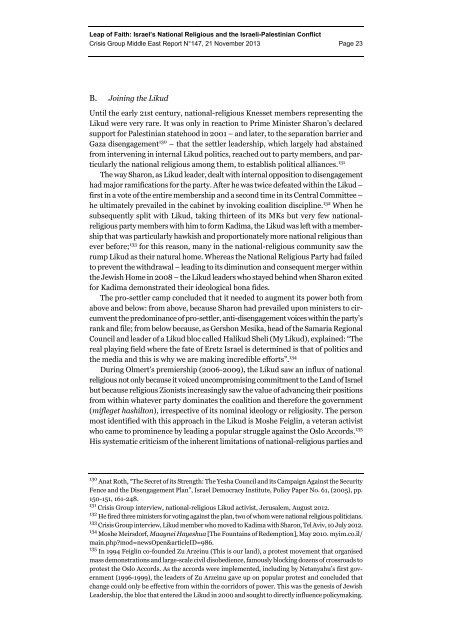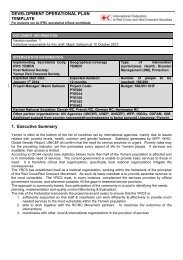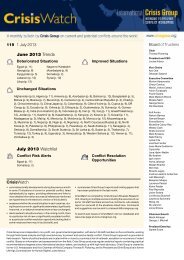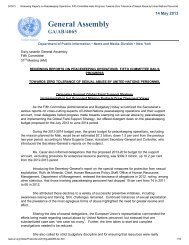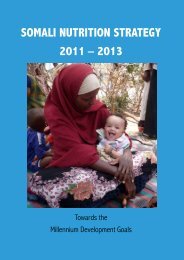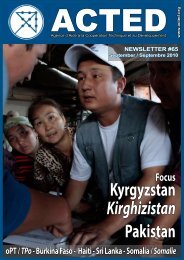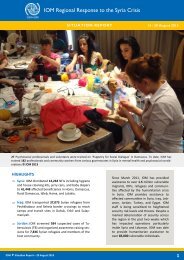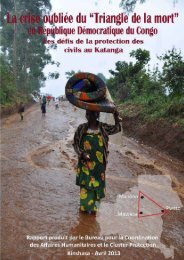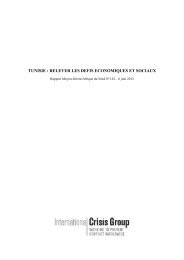Leap of Faith: Israel's National Religious and the Israeli ... - ReliefWeb
Leap of Faith: Israel's National Religious and the Israeli ... - ReliefWeb
Leap of Faith: Israel's National Religious and the Israeli ... - ReliefWeb
You also want an ePaper? Increase the reach of your titles
YUMPU automatically turns print PDFs into web optimized ePapers that Google loves.
<strong>Leap</strong> <strong>of</strong> <strong>Faith</strong>: Israel’s <strong>National</strong> <strong>Religious</strong> <strong>and</strong> <strong>the</strong> <strong>Israeli</strong>-Palestinian Conflict<br />
Crisis Group Middle East Report N°147, 21 November 2013 Page 23<br />
B. Joining <strong>the</strong> Likud<br />
Until <strong>the</strong> early 21st century, national-religious Knesset members representing <strong>the</strong><br />
Likud were very rare. It was only in reaction to Prime Minister Sharon’s declared<br />
support for Palestinian statehood in 2001 – <strong>and</strong> later, to <strong>the</strong> separation barrier <strong>and</strong><br />
Gaza disengagement 130 – that <strong>the</strong> settler leadership, which largely had abstained<br />
from intervening in internal Likud politics, reached out to party members, <strong>and</strong> particularly<br />
<strong>the</strong> national religious among <strong>the</strong>m, to establish political alliances. 131<br />
The way Sharon, as Likud leader, dealt with internal opposition to disengagement<br />
had major ramifications for <strong>the</strong> party. After he was twice defeated within <strong>the</strong> Likud –<br />
first in a vote <strong>of</strong> <strong>the</strong> entire membership <strong>and</strong> a second time in its Central Committee –<br />
he ultimately prevailed in <strong>the</strong> cabinet by invoking coalition discipline. 132 When he<br />
subsequently split with Likud, taking thirteen <strong>of</strong> its MKs but very few nationalreligious<br />
party members with him to form Kadima, <strong>the</strong> Likud was left with a membership<br />
that was particularly hawkish <strong>and</strong> proportionately more national religious than<br />
ever before; 133 for this reason, many in <strong>the</strong> national-religious community saw <strong>the</strong><br />
rump Likud as <strong>the</strong>ir natural home. Whereas <strong>the</strong> <strong>National</strong> <strong>Religious</strong> Party had failed<br />
to prevent <strong>the</strong> withdrawal – leading to its diminution <strong>and</strong> consequent merger within<br />
<strong>the</strong> Jewish Home in 2008 – <strong>the</strong> Likud leaders who stayed behind when Sharon exited<br />
for Kadima demonstrated <strong>the</strong>ir ideological bona fides.<br />
The pro-settler camp concluded that it needed to augment its power both from<br />
above <strong>and</strong> below: from above, because Sharon had prevailed upon ministers to circumvent<br />
<strong>the</strong> predominance <strong>of</strong> pro-settler, anti-disengagement voices within <strong>the</strong> party’s<br />
rank <strong>and</strong> file; from below because, as Gershon Mesika, head <strong>of</strong> <strong>the</strong> Samaria Regional<br />
Council <strong>and</strong> leader <strong>of</strong> a Likud bloc called Halikud Sheli (My Likud), explained: “The<br />
real playing field where <strong>the</strong> fate <strong>of</strong> Eretz Israel is determined is that <strong>of</strong> politics <strong>and</strong><br />
<strong>the</strong> media <strong>and</strong> this is why we are making incredible efforts”. 134<br />
During Olmert’s premiership (2006-2009), <strong>the</strong> Likud saw an influx <strong>of</strong> national<br />
religious not only because it voiced uncompromising commitment to <strong>the</strong> L<strong>and</strong> <strong>of</strong> Israel<br />
but because religious Zionists increasingly saw <strong>the</strong> value <strong>of</strong> advancing <strong>the</strong>ir positions<br />
from within whatever party dominates <strong>the</strong> coalition <strong>and</strong> <strong>the</strong>refore <strong>the</strong> government<br />
(mifleget hashilton), irrespective <strong>of</strong> its nominal ideology or religiosity. The person<br />
most identified with this approach in <strong>the</strong> Likud is Moshe Feiglin, a veteran activist<br />
who came to prominence by leading a popular struggle against <strong>the</strong> Oslo Accords. 135<br />
His systematic criticism <strong>of</strong> <strong>the</strong> inherent limitations <strong>of</strong> national-religious parties <strong>and</strong><br />
130 Anat Roth, “The Secret <strong>of</strong> its Strength: The Yesha Council <strong>and</strong> its Campaign Against <strong>the</strong> Security<br />
Fence <strong>and</strong> <strong>the</strong> Disengagement Plan”, Israel Democracy Institute, Policy Paper No. 61, (2005), pp.<br />
150-151, 161-248.<br />
131 Crisis Group interview, national-religious Likud activist, Jerusalem, August 2012.<br />
132 He fired three ministers for voting against <strong>the</strong> plan, two <strong>of</strong> whom were national religious politicians.<br />
133 Crisis Group interview, Likud member who moved to Kadima with Sharon, Tel Aviv, 10 July 2012.<br />
134 Moshe Meirsdorf, Maaynei Hayeshua [The Fountains <strong>of</strong> Redemption], May 2010. myim.co.il/<br />
main.php?mod=newsOpen&articleID=986.<br />
135 In 1994 Feiglin co-founded Zu Arzeinu (This is our l<strong>and</strong>), a protest movement that organised<br />
mass demonstrations <strong>and</strong> large-scale civil disobedience, famously blocking dozens <strong>of</strong> crossroads to<br />
protest <strong>the</strong> Oslo Accords. As <strong>the</strong> accords were implemented, including by Netanyahu’s first government<br />
(1996-1999), <strong>the</strong> leaders <strong>of</strong> Zu Arzeinu gave up on popular protest <strong>and</strong> concluded that<br />
change could only be effective from within <strong>the</strong> corridors <strong>of</strong> power. This was <strong>the</strong> genesis <strong>of</strong> Jewish<br />
Leadership, <strong>the</strong> bloc that entered <strong>the</strong> Likud in 2000 <strong>and</strong> sought to directly influence policymaking.


